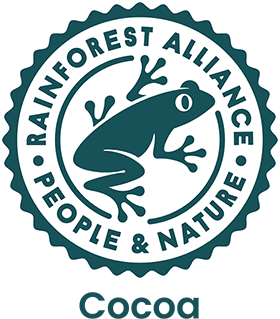Sustainable Procurement of Cocoa
Material Issue
Sustainabile Procurement
Management information
Relevance to our business
The Fuji Oil Group's industrial chocolate business purchases cocoa-derived raw materials such as cocoa beans, cocoa liquor,*1 cocoa butter,*2 and cocoa powder*3 as key raw materials, and uses them to produce chocolate products.
Smallholders make up the majority of producers in Côte d'Ivoire and Ghana, the two major cocoa-producing countries, giving rise to a complex web of social and environmental issues. These include poverty and, linked to this, the challenges of children's education and child labor, low agricultural productivity, deforestation and climate change impacts. Addressing these issues requires a multifaceted approach, which includes enhancing soil fertility, empowering women, ensuring children's access to education and their overall protection, as well as reforestation efforts. We recognize that it is our role and responsibility to respect human rights, conserve natural resources, build cocoa supply chains that lift farmers out of poverty, and ensure the viability of the cocoa supply now and into the future.
- *1 Made by removing the shells of cocoa beans and grinding the nibs (inside the cocoa beans) into a smooth, liquid state
- *2 Vegetable oil obtained by pressing cocoa beans
- *3 Dry powder made by grinding what is left after the cocoa butter has been removed from the cocoa beans

Basic approach
In August 2018, the Fuji Oil Group published the Responsible Cocoa Beans Sourcing Policy. In 2020, we set medium- to long-term goals and KPIs to realize the sustainable procurement of cocoa beans and track its progress.
Moving forward, we will continue to work on raising household's income, ending child labor, restoring forests, by improving supply chain transparency and strengthening traceability.
Management system
The Chief Strategy Officer (CSO) oversees initiatives in this area.
The Sustainability Committee,*1 an advisory body to the Board of Directors, monitors the progress and results of initiatives as a material ESG issue.*2
Goals / Results
At least 90% complete At least 60% complete Less than 60% complete
| Medium- to long-term goals | KPI | FY2022 Goals | FY2022 Results | Self-assessment | |
|---|---|---|---|---|---|
| 2030 | 2025 | ||||
| Reforestation and forest protection | One million trees planted*1 | 500,000 trees planted | Select partners for continuing initiative to plant one million trees |
|
|
| Complete GPS mapping of 90% of farms in direct supply chain and improve traceability | 89% of farm plots mapped within direct supply chain (Côte d'Ivoire, Ghana, Ecuador). | ||||
| Provide GAP*3 training and/or coaching to farms in direct supply chain | 30,846 farmers participated in the GAP training program (Côte d'Ivoire, Ghana and Ecuador) | ||||
| Elimination of child labor | Elimination of child labor | No worst forms of child labor*2 | Establish Child Labour Monitoring and Remediation systems (CLMRS) in all farmer groups in our direct supply chain. | CLMRS operational in 100% of farmer groups from which the Fuji Oil Group directly procures cocoa beans | |
| Implement comprehensive community development to support women's empowerment |
|
||||
- *1 We plan to plant a variety of shade tree saplings, totaling one million trees over a 10-year period from 2021 through 2030.
- *2 The International Labour Organization (ILO) Convention No. 182, known as the Convention concerning the Prohibition and Immediate Action for the Elimination of the Worst Forms of Child Labour, prohibits hazardous work that may harm the health, safety, or morals of children. This includes the sale and trafficking of children, debt bondage, forced or compulsory labor, prostitution and pornography, illegal activities such as crime, and recruitment of children for use in armed conflict.
- *3 Good Agricultural Practices
Analysis
To implement the Responsible Cocoa Beans Sourcing Policy formulated in August 2018, we set KPIs in June 2020 and determined a direction for our efforts over the next 10 years. Blommer Chocolate Company (U.S.), which became a member of the Fuji Oil Group in 2019, has been playing a major role in this.
In FY2022, we planted a wide variety of 60,000 shade trees. If cocoa saplings are included, the number of trees planted exceeded 100,000. We have also completed the selection of partners for tree planting for 2023 and beyond, and will continue undertaking activities to achieve our target for number of trees planted.
For women's empowerment, we have substantially exceeded our goals with the cooperation of our customers who support our development activities.
Going forward, we will continue collaborating closely with our customers, suppliers, certification bodies and international organizations to develop programs and initiatives in line with the Group's sourcing policy.
Next step
Crucial elements of our initiatives include raising the income of farming households, protecting children, providing educational opportunities to cocoa farming families, empowering women, and conserving and regenerating forests. To address these issues, we set the following goals for FY2023.
- Complete GPS mapping of 90% of farms in direct supply chain and improve traceability system
- Continue introducing the Child Labour Monitoring and Remediation System (CLMRS) in farming communities across our direct supply chain
- Provide support for women's empowerment in 173 communities across our supply chain (Côte d'Ivoire, Ghana and Ecuador)
- Continue GAP training to farms across our direct supply chain
- Plant 130,000 trees across our direct supply chain (Côte d'Ivoire)
- Assess deforestation related to the supply chain using data provided by Satelligence* and conduct deforestation risk assessment for over 140,000 hectares of land
- Distribute around 270,000 saplings for a wide variety of shade trees in and around plantations conducted by the Blommer Chocolate Company (U.S.) (Côte d'Ivoire, Ghana)
- * See the section "Conserving and restoring forests by planting trees."
Specific initiatives
Solution-based approaches to implementing the Responsible Cocoa Beans Sourcing Policy
| Social issue | Solution-based approach | Location/scope |
|---|---|---|
| Global environment | Restore forests by planting trees in plantations and surrounding areas | Mainly Ghana and Côte d'Ivoire |
| Human rights | Introduce CLMRS and provide educational opportunities to children | West Africa (Ghana, Côte d’Ivoire) |
| Global environment and human rights | Implement community development programs | West Africa (Ghana, Côte d’Ivoire) |
Traceability
Improving traceability across the supply chain is critical to addressing social and environmental issues in the cocoa supply chain. In all farmer groups in our direct supply chain, we are working with our suppliers to map out the boundary lines (polygons) of the farms. The process, called polygon mapping, is used as the basis for establishing compliance regarding protected areas. Plantation polygons can also be used to assess deforestation related to the supply chain using satellite imagery.
Monitoring the situation of cocoa farmers and their families is also vital to protect children and prevent child labor. Every year, Blommer (U.S.) publishes a map of farm groups in its direct supply chain of farms on its website.*
Blommer's sustainability team working in Côte d'Ivoire plays a major role in overseeing and implementing the program, as well as checking its effectiveness and assessing its impacts. The farm groups supplying the company are audited annually by product certification bodies or third-party auditing organizations.
Children protection
The Fuji Oil Group is working to end child labor — a significant human rights issue in the cocoa industry.
In major cocoa-producing countries, farms face challenges such as absolute poverty, child labor, lack of community infrastructure such as schools and health centers, lack of farm workers, and lack of capital to invest in improving agricultural technology, each of which has to be addressed appropriately. The Group focuses on creating an environment to prevent child labor and on developing a mechanism to remediate any violations of children's rights along the supply chain.
To identify the root causes of child labor and raise awareness of potential violations, community agents and farmer groups are working together to set up the Child Labour Monitoring and Remediation System (CLMRS) at all villages in our direct cocoa supply chain in West Africa. Community agents who monitor and carry out remediation measures are trained on child protection and conduct household surveys regularly. In addition, initiatives such as supporting cocoa farmers by providing pruning guidance, promoting women's empowerment through VSLA,*1 and environmental conservation*2 also help in preventing and remediating child labor.
We also work with other stakeholders in the cocoa industry on industry-wide initiatives. In 2022, the Group joined two industry initiatives in Côte d'Ivoire – Child Learning and Education Facility (CLEF)*3 and Early Learning and Nutrition Facility (ELAN)*4 – aimed at eradicating child labor and providing children with good quality of life and education.
- *1 See the section “Community development and women's empowerment.”
- *2 See the section “Conserving and restoring forests.”
- *3 https://jacobsfoundation.org/en/activity/clef-elan/
- *4 https://jacobsfoundation.org/wp-content/uploads/2020/04/ELAN_Factsheet_ENG_final-2.pdf
CLMRS (Child Labour Monitoring & Remediation System)
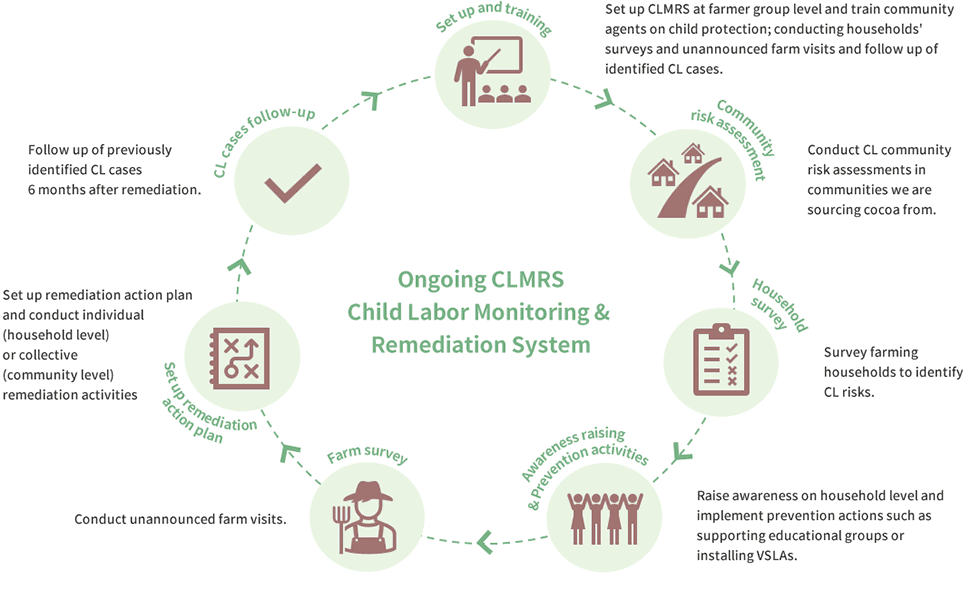
Supporting cocoa farmers
The Fuji Oil Group directly supports cocoa farms in Côte d'Ivoire (since 2004), Ghana (since 2014) and Ecuador (since 2013). We provide tools and training based on existing agricultural technologies, and encourage farmers to adopt Good Agricultural Practices (GAP) and climate-smart cocoa practices.* Pruning is particularly important in GAP, so we launched service groups focused on pruning at the community level in order to provide willing farmers with paid labor services. Although there are major challenges such as pests, diseases and changes in climate patterns (particularly rainfall), we hope that the adoption of GAP will ultimately improve the resilience of farms.
Farmers and communities who participate in the program receive a premium (financial aid) for the cocoa covered by this initiative. Premiums are also paid as compensation for the additional work required to comply with the Group's internal and third-party standards, and supply traceable and sustainable cocoa beans. The premiums paid to the farmers also directly participate in improving the farming household income. Farmer groups are also encouraged to reinvest a percentage of their respective premiums for social initiatives that benefit the entire cocoa farm community through the construction and repair of classrooms, school cafeterias and water pumps, among others.
- * A sustainable agricultural approach aimed at mitigating and adapting to climate change impacts in growing cocoa. The focus is on improving the resilience of cocoa cultivation, reducing greenhouse gas emissions and promoting sustainable farming practices.
Community development and women’s empowerment
The Fuji Oil Group believes that to realize sustainable procurement, it is important to meet the needs, not only of cocoa farmers, but also of the local communities in the sourcing regions. We facilitate the construction of social infrastructure, such as schools, health centers, maternity hospitals and access to safe water at cocoa-producing communities.
Women play a huge role in ensuring food security and access to nutrition, education and health in cocoa-producing communities and their families. Our community development projects in Ghana and Côte d'Ivoire focus on empowering women in their homes and communities in order to create economic opportunities for women. As part of these efforts, we offer literacy training courses for women and established village savings and loans associations (VSLA). The VSLA is a women-led mutual aid group offering access to savings and loans to its members for investing in existing or new micro-businesses, funding children's education, or funding income generating activities (IGA) for capacity development. Initiatives based on this concept have been impactful and are growing.
Conserving and restoring forests
The Fuji Oil Group is committed to reducing its carbon footprint, achieving a supply chain free of deforestation, and protecting biodiversity.
We focus on promoting climate-smart agricultural practices and restoring ecosystems to ensure long-term benefits for cocoa farmers and their communities.
Partnerships with governments and businesses
Blommer (U.S.) has been participating in the Cocoa & Forests Initiative (CFI) since 2017. CFI's 36 participating companies are working with the governments of Côte d'Ivoire and Ghana to end deforestation and promote the protection and restoration of forests in cocoa supply chains. In Phase I (2018-2022), participating companies distributed 21.7 million seedlings of various types of shade trees for agroforestry and restoration of forests. Participating companies reached an average of 72% traceability in their direct supply chains in both countries and created polygon maps of large-scale plantations. For CFI Phase I, Blommer distributed 990,987 shade trees, achieved 84% traceability and we had 30,110 ha of cocoa agroforestry in development in our direct supply chain (Côte d'Ivoire, Ghana). The program for CFI Phase II started in 2023.
Blommer also collaborates with other participating companies in the World Cocoa Foundation to streamline carbon accounting and provide guidance on reducing CO2 emissions in cocoa farming. We expect further achievements from this project in 2023.
Partnership with Satelligence
In 2022, the Fuji Oil Group partnered with Satelligence, a global leader in forest monitoring, to assess and address deforestation risks in Côte d'Ivoire, Ghana and Ecuador. Using satellite images, Satelligence detects changes in cocoa canopy cover, monitors variations in CO2 emissions and carbon sequestration in and around cocoa plantations, assesses deforestation risk, and identifies shaded cocoa regions.
Blommer (U.S.) also implemented a real-time risk alerting system to address deforestation and forest degradation. Satelligence's initial assessment covers around 50,000 km2 of land across Côte d'Ivoire, Ghana and Ecuador. We conduct a Deforestation Risk Assessment (DRA) in our direct supply chain and 144,095 ha within the direct supply chain have DRAs completed (Côte d'Ivoire, Ghana, Ecuador).
A report published by Satelligence on land cover change in the area from 2001 to 2021 as well as on Forest Loss Risk Index (FLRI) found no clear trends for deforestation over time across the company's cocoa supply chain. The consistently low level of deforestation in Blommer's supply chains is the result of its ongoing commitment to fight deforestation.
Partnership with AGRO-MAP
In 2022, the Fuji Oil Group partnered with AGRO-MAP to achieve its 2030 commitment of planting one million trees in cocoa-growing regions*. Through the partnership, we will plant 130,000 different types of shade tree saplings and fruit trees in our direct cocoa supply chains in Côte d'Ivoire in 2023. The project aims to promote cocoa agroforestry and community reforestation, as well as diversify the income of cocoa farmers through IGA. Furthermore, we plan to strengthen the resilience of producers and communities affected by climate change, contribute to CO2 emission reduction and protect biodiversity.
Initiatives in Japan (Membership in the Platform for Sustainable Cocoa in Developing Countries)
Fuji Oil Holdings Inc. joined the Platform for Sustainable Cocoa in Developing Countries, an initiative with the Japan International Cooperation Agency (JICA) acting as Secretariat. Fuji Oil Co., Ltd. has expressed support for the Action Plan to Eliminate Child Labour in the Cocoa Industry, which was released by the platform.
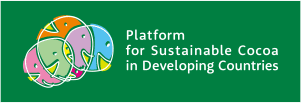
Participation in the World Cocoa Foundation (WCF)
Fuji Oil Group is a member of the World Cocoa Foundation (WCF)*1 since February 2012. The WCF is a non-profit international organization whose vision is a sustainable and thriving cocoa sector ― where farmers prosper, cocoa-growing communities are empowered, human rights are respected, and the environment is conserved.
Blommer (U.S.) is a founding member of the WCF and currently holds a seat on the WCF Board. The company has demonstrated a leadership role through participation in the WCF flagship programs, such as African Cocoa Initiative, Cocoa Livelihoods Program, Cocoa Action, and the Cocoa and Forests Initiative (CFI)*2.
We delivered on our Cocoa Forest Initiative (CFI) commitments: 491,309 multipurpose trees were distributed for off-farm and on-farm planting (Côte d'Ivoire, Ghana) by Blommer (U.S.) directly and on behalf of customers."

Handling of certified cocoa-derived raw materials
Fairtrade
The following Group companies have obtained the Fairtrade International certification, which aims to promote sustainable development of smallholders and workers in developing countries. These three companies offer Fairtrade certified products for manufacturing needs of our customers.
- Industrial Food Services (Australia)
- Fuji Oil Europe (Belgium)
- Blommer Chocolate Company (U.S.)
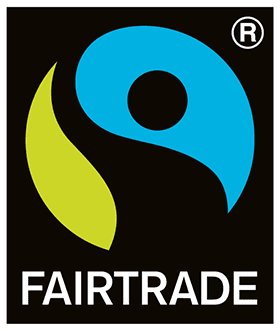
Fair Trade USA
Blommer Chocolate Company (U.S.) has obtained the Fair Trade USA certification.
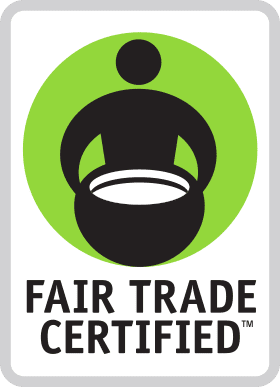
Rainforest Alliance Certification
The following Group companies comply with the Rainforest Alliance* Sustainable Agriculture Standard: Supply Chain Requirements, which an international certification program aims to create a better future for people and nature. Going forward, we will continue to work to meet the demands of our customers for responsible cocoa sourcing.
- The Fuji Oil Hannan Business Operations Complex and Kanto Plant (Japan)
- Industrial Food Services (Australia)
- PT. Freyabadi Indotama (Indonesia)
- Freyabadi (Thailand) Co., Ltd. (Thailand)
- Fuji Global Chocolate (M) Sdn. Bhd. (Malaysia)
- Fuji Oil Europe (Belgium)
- Harald Indústria e Comércio de Alimentos Ltda (Brazil)
- Blommer Chocolate Company (U.S.)
- Blommer Chocolate Manufacturing (Shanghai) Company Ltd. (China)
- Fuji Oil (Zhang Jia Gang) Co., Ltd. (China)
